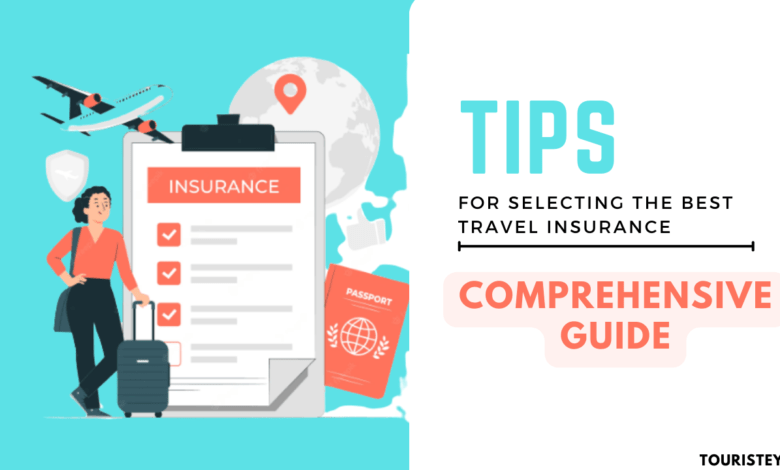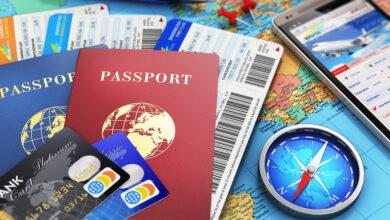Tips for Selecting the Best Travel Insurance: A Comprehensive Guide
Ensuring Safe Journeys: Navigating Your Way to the Ideal Travel Coverage

Traveling is an exciting adventure, but things don’t always go as planned. That’s why having comprehensive travel insurance is so important – it provides protection in case you encounter illness, injury, travel delays, lost luggage, and other unforeseen circumstances. With the right travel insurance policy, you can travel with greater peace of mind knowing you are covered if something goes wrong.
This guide will provide an in-depth look at travel insurance, including different types of policies, key benefits to look for, factors to consider when choosing a plan, estimating costs, and tips for getting the most value from your policy. We’ll also bust some common myths about travel insurance so you can make an informed decision. Read on to learn how to select the best travel insurance plan for your next trip!
Types of Travel Insurance Policies
There are a few main types of travel insurance to consider:
- Trip Cancellation/Interruption Insurance – Provides reimbursement for forfeited, non-refundable payments if you need to cancel or interrupt a trip due to covered reasons like illness or injury. This is one of the most popular and important policy benefits.
- Emergency Medical Insurance – Covers emergency medical treatment overseas in case of illness or injury, including hospitalization, ambulance transport, and prescriptions. Usually includes emergency medical evacuation.
- Travel Delay Insurance – Reimburses expenses like accommodations, meals, and toiletries if your travel is delayed for a covered reason.
- Baggage Loss/Damage Insurance – Provides reimbursement if your luggage or personal items are lost, damaged, or stolen during travel.
- Rental Car Damage Insurance – Covers damage to a rental vehicle. This may overlap with coverage provided by your personal auto insurance policy or credit card benefits.
Some companies also offer coverage like trip delay insurance, which provides reimbursement for additional costs if your trip is delayed for reasons beyond your control. When comparing plans, look closely at what perils or events are covered under each policy.
The Importance of Travel Insurance
Before diving into the specifics, let’s understand why travel insurance is crucial. It serves as a financial safety net in case things don’t go as planned. Whether it’s a canceled trip, a medical emergency, or lost luggage, travel insurance can save you from unexpected expenses and stress.
Assess Your Travel Needs
The first step in choosing the right travel insurance is to assess your specific needs. Consider factors like your destination, the duration of your trip, and your personal health. Are you traveling internationally, or is it a domestic trip? Your answers will help you determine the level of coverage required.
Types of Travel Insurance
Travel insurance comes in various forms, each catering to different aspects of your trip:
1. Trip Cancellation Insurance
This type of insurance covers cancellations due to unforeseen circumstances like illness, natural disasters, or other emergencies. It ensures you get reimbursed for non-refundable expenses.
2. Travel Medical Insurance
If you’re traveling abroad, medical coverage is vital. It covers medical expenses, emergency medical evacuation, and repatriation in case of injury or illness during your trip.
3. Baggage and Personal Belongings Coverage
Losing your luggage can be a nightmare. Baggage coverage reimburses you for lost or damaged belongings.
Coverage Limits and Exclusions
Every insurance policy has its limits and exclusions. Be sure to read the fine print to understand what’s covered and what’s not. Pay attention to coverage limits, deductibles, and any specific exclusions that may apply.
Compare Insurance Providers
Don’t settle for the first insurance provider you come across. Shop around and compare quotes from multiple insurers. Look for ones that offer the coverage you need at a competitive price.
Read Customer Reviews
Customer reviews can provide valuable insights into an insurer’s reputation and customer service. Look for reviews from travelers who have claimed to gauge how the company handles real-life situations.
Check for Pre-Existing Conditions
If you have pre-existing medical conditions, make sure your travel insurance covers them. Some policies may exclude coverage for pre-existing conditions unless you pay an additional premium.
Travel Insurance Cost
Consider your budget when selecting insurance. While you don’t want to cut corners on coverage, you also don’t want to overpay for unnecessary benefits.
Claim Process and Customer Support
A smooth claims process is crucial. Research how easy it is to file a claim and the responsiveness of the insurer’s customer support team.
Emergency Assistance Services
Find out if the insurer offers 24/7 emergency assistance. This can be a lifesaver in case of emergencies in a foreign country.
Additional Benefits
Some policies come with extra perks, such as coverage for trip interruptions, rental car protection, or coverage for adventure sports. Determine if these are relevant to your trip.
Duration of Coverage
Check the duration of coverage. Ensure it covers your entire trip, including any unexpected delays or extensions.
Policy Renewal and Cancellation
Understand the policy’s renewal and cancellation terms. Some policies may offer pro-rata refunds if your plans change.
Policy Jargon
Insurance policies can be filled with jargon. Take the time to understand key terms, such as premiums, deductibles, and coverage limits.
Protect Your Journey
Selecting the best travel insurance involves careful consideration of your unique travel needs, comparing options, and reading the fine print. Don’t rush this decision, as having the right coverage can make all the difference during your travels.
You can also check out our post on Travel Budgeting
Key Travel Insurance Benefits to Look For
While all travel insurance policies are different, there are some key benefits that are important to have in your plan:

→ Trip cancellation/interruption coverage:
This is the most vital benefit, as it protects your prepaid, non-refundable trip expenses if you need to cancel for a covered reason. Make sure it covers your specific reasons for canceling like illness, injury, job loss, terrorist event, and more. Also look for coverage of interruption costs if you must cut a trip short.
→ Emergency medical/dental coverage:
Medical care abroad can be extremely expensive, so it’s crucial to have emergency medical and dental coverage in case you become injured or sick during your trip. Confirm it covers hospitalization costs, visits to the ER or doctor, ambulances, prescriptions, and medical evacuations.
→ Emergency medical evacuation:
In case you suffer a serious medical emergency overseas, emergency medical evacuation provides transportation via air ambulance to a hospital that can provide proper treatment. This hugely expensive service can be a lifesaver.
→ Baggage protection:
Check that your plan reimburses you if your luggage is lost, damaged, stolen, or delayed by the airline. Some plans may only cover loss/theft but not damage, so read the fine print.
→ 24/7 emergency assistance services:
Reputable providers offer services like providing medical referrals, handling hospital payments, medication and ambulance coordination, lost passport assistance, and other help.
Nowadays, big traveling insurance companies including Allianz SE & Travelex are working on their networking advertisements to touch a large audience.
Factors to Consider When Choosing a Travel Insurance Company
Once you decide what benefits are most important, it’s time to compare travel insurance providers. Here are key factors to evaluate:
- Reputation and customer service: Look for established insurers known for smooth claims processes and stellar customer service. Research online reviews and complaints.
- Coverage details: Review the fine print to confirm your specific trip, reasons for canceling, belongings, activities, and other needs are covered. Beware of exclusions.
- Pre-existing medical condition coverage: Many policies exclude pre-existing conditions, so if you have one be sure to find a provider that covers it. Complete any required medical questionnaires honestly.
- Adventure/extreme sport coverage: If you’ll participate in activities like mountain climbing, scuba diving, or bungee jumping, make sure they’re covered under the policy you choose.
- Trip duration coverage: Most policies limit coverage to trips of 30 days or less. For longer trips, look for insurers that cover 6-12 month trips.
- Travel assistance services: Go with a company that offers robust assistance services like referrals, hospital payments, replacing lost passports, cash transfers, and medical evacuations.
- Price: Compare quotes across multiple insurers. Sometimes the cheapest option is best, but weigh the price against factors like coverage, service, and financial stability ratings.
Estimating Your Travel Insurance Costs
Travel insurance premiums are based on a few key factors:
- Trip cost – The price of your trip before airfare and insurance. For trip cancellation/interruption insurance, the policy must cover total trip costs to be effective.
- Trip length – Shorter trips (under 7 days) cost less to insure than longer trips (months-long).
- Destination – High risk destinations like the Caribbean during hurricane season cost more.
- Age – Older travelers generally pay a higher premium.
- Activities – Adventurous trips including activities like scuba diving have higher premiums.
Many insurers provide free quote tools on their websites so you can input your unique trip details to get an instant price estimate. Expect to pay between 4-8% of your total nonrefundable trip costs for a comprehensive policy.
For example, a two week Europe trip costing $5,000 before airfare/insurance would cost about $200-$400 to insure. For a ballpark estimate, you can budget 5-10% of trip costs for insurance premiums.
Getting the Most Value from Your Travel Insurance Policy
To make the most of your travel insurance purchase, keep these tips in mind:
- Shop early – Purchase within 1-2 weeks of your initial trip payment to get the full pre-existing condition coverage.
- Read carefully – Don’t skim the fine print. Know what triggers benefits and any exclusions.
- Provide full medical history – Complete medical questionnaires honestly so claims aren’t denied later. Update insurer if health changes pre-trip.
- Save documents – Keep copies of your policy, medical reports, travel records, and other claim-related documents.
- Report claims quickly – Notify your provider right away if you need to cancel, interrupt, or file a claim for reimbursement. Act fast.
- Use assistance services – Take advantage of services like doctor referrals and replacing lost passports if issues arise during your trip.
Busting Common Travel Insurance Myths
There are some misconceptions about travel insurance that cause travelers to miss out on its benefits. Here are some myths, debunked:
- “I don’t need it for quick trips” – Even short weekend getaways are candidates for travel insurance. Key benefits like emergency medical and trip delay coverage can be useful even on brief trips.
- “It’s too expensive” – Policies may seem costly upfront, but your investment is returned many times over if you actually need to file a claim. The value outweighs the premium.
- “My credit card covers me” – While some cards include limited travel coverage, it likely won’t equal the comprehensive benefits of a standalone policy. Card benefits have limits and exclusions.
- “I’m healthy so don’t need emergency medical coverage” – Even healthy travelers can unexpectedly get injured or sick while abroad. Don’t take the risk of massive medical bills.
- “It’s useless because claims get denied” – Reputable insurers pay out the majority of eligible claims. Read the policy carefully so you understand what is and isn’t covered.
FAQs
1. Is travel insurance necessary for domestic trips?
While it’s not mandatory, travel insurance can still provide benefits like trip cancellation coverage and medical assistance, which can be valuable for domestic trips.
2. What is the ideal time to purchase travel insurance?
It’s advisable to buy travel insurance shortly after booking your trip. This ensures you’re covered for unexpected events that may arise before your departure.
3. Can I cancel my travel insurance policy if my plans change?
Yes, most policies allow for cancellation with a refund, typically within a specific timeframe. Be sure to check your policy’s terms.
4. Do all travel insurance policies cover adventure sports?
No, not all policies include coverage for adventure sports. If you plan to engage in such activities, look for a policy that specifically offers this coverage.
5. What should I do if I need to make a claim while abroad?
Contact your insurance provider’s emergency assistance number immediately. They will guide you through the claim process and provide support during the crisis.
The Bottom Line
Considering travel insurance’s ability to protect your finances, save you from hospital bills abroad, cover you if plans go sideways, and give you peace of mind, there’s no reason not to purchase a policy for your next big trip. Just be sure to choose comprehensive coverage with an established, trusted insurer.
Pay close attention to policy details, compare pricing across providers, and purchase within two weeks of your first booking to lock in the most coverage. While no one hopes they actually have to use their travel insurance benefits, you’ll be extremely grateful for the protection if you ever do need it.
With this guide’s tips for choosing the best plan, getting insured is easy. All that’s left to do is pack your bags and set off on your adventure – now with greater confidence and security! Where will your travels take you next?




Facebook Comments